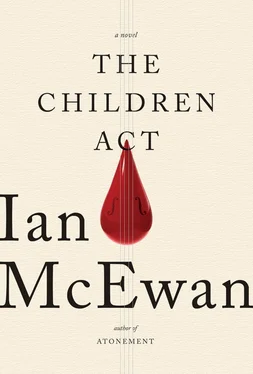Ushers were passing through the crowd announcing that the concert was about to begin. People moved with reluctance toward the chairs. It was difficult at first to exchange good wine and gossip for solemn music. But the glasses were being collected and the din was subsiding. She was making her way to the steps by the right-hand corner of the stage when she felt the touch of a hand on her shoulder and turned. It was Sherwood Runcie of the Martha Longman case. For some reason, in black tie. The uniform gave men of a certain age with bulging stomachs a trapped and pathetic air. He put his hand on her arm, wanting to impart an item of interest to her that had been kept out of the newspapers. She leaned in to catch his words. Her mind was already on the concert, her heartbeat already tightening, and she found it hard to concentrate on what he was saying, though she thought she had grasped it. Just as she was asking the judge to repeat himself, she became aware of Mark ahead of her, turning back to make impatient signs. She straightened, thanked Runcie and followed her tenor toward the stage.
While they stood at the foot of the steps waiting for their audience to settle and for their signal to go on, he said, “Are you all right?”
“I’m fine. Why?”
“You look pale.”
“Mm.”
Automatically, she touched her hair with the fingertips of one hand. In the other was her music. She gripped it tighter. Did she look deranged? She reckoned up what she had drunk. No more than three sips of the white wine Mark had warned her off. About two glasses in all. She would be fine. He handed her toward the steps and as they went up to stand by the piano and dipped their heads by way of a bow, they met the sort of applause reserved for a home team. This was, after all, their fifth Christmas concert in the Great Hall.
When she sat down, arranged the music before her and made an adjustment to the piano stool, she drew a deep breath and softly exhaled to purge herself of the last scraps of recent conversation, of the stuttering barrister, the cheerful work-deprived young women. And Runcie. No. No time to think. Mark nodded at her to show he was ready, and immediately her fingers were summoning from the colossal instrument the gently rocking chords and her mind seemed to follow behind. The tenor’s entry was perfect, and within a few bars they were locked into a unity of purpose they had rarely touched in rehearsal, no longer concentrating on simply getting things right, but able to dissolve into the music without effort. It crossed her mind that she had drunk just the right quantity of wine. The smooth deep power of the Fazioli lifted her. It was as if she and Mark were being borne easily downstream on a current of notes. His voice sounded warmer to her ears, bang on the note, free of the tuneless vibrato he sometimes deployed, free to search out all the delight in Berlioz’s setting of the “Villanelle,” and then, later, in the “Lament,” all the sorrow of the steeply falling line, Ah! Sans amour s’en aller sur la mer! Her own playing looked after itself. As her fingers touched the keys, she heard herself as though she were sitting at the back of the audience, as if all that was required of her was to be present. Together, she and Mark entered the horizonless hyperspace of music-making, beyond time and purpose. She was only faintly aware that something waited for her return, for it lay far below her, an alien speck on a familiar landscape. Perhaps it wasn’t there, perhaps it wasn’t true.
They emerged as from a dream and stood side by side to face their audience again. The applause was loud, but it always was. In the spirit of Great Hall seasonal generosity, it was often louder for the ropier performances. It was only when she met Mark’s glance and saw the shine in his eyes that she was certain that they had broken through the usual confines of amateur playing. They had actually brought something to the piece. If there was a woman in the audience he’d been wanting to impress, then she had been wooed in old-fashioned style and she surely must fall for him.
The silence fell abruptly as they took their places for the Mahler. Now she was on her own. The long introduction gave an impression of being invented by the pianist as it unfolded. With infinite patience, two notes tentatively sounded, then repeated and another added, then those three repeated, and only with the fourth did the line at last stretch luxuriantly upward into one of the loveliest melodies the composer ever devised. She didn’t feel unhappily exposed. She even managed to achieve what was second nature to first-rate pianists and coax from certain notes above middle C a bell-like sound. Elsewhere, she thought by her touch she could persuade her listeners that they could hear the harp that belonged in the orchestral version. Right from his entry, Mark caught the spirit of tranquil resignation. For some reason he’d insisted on singing in English, not German, a freedom only granted to amateurs. The gain was the immediacy with which everyone understood a man retreating from the tumult. I really am as good as dead to the world . The couple sensed they were holding their audience, and their performance rose further. Fiona also knew she was moving at a stately pace toward something terrible. It was true, it wasn’t true. She would know only when the music ceased and she confronted it.
Again, the applause, the faint bows, and now, the calls for an encore. There was even some foot-stamping, which began to grow louder. The performers looked at each other. There were tears in Mark’s eyes. She felt her smile to be rigid. There was a metallic taste in her mouth as she turned back to the piano stool and the audience quietened. For seconds she kept her hands on her lap and her head down, refusing to glance across at her partner. From their selection of pieces committed to memory, they had already agreed on Schubert’s “An die Musik.” An old favorite. It never failed. She placed her hands in preparation on the keys but still she did not look up. The silence in the hall was complete, and finally she began. The ghost of Schubert may have blessed the introduction she played, but the rising three notes, a broken chord tenderly echoed lower, and again lower still, then resolving, belonged to another hand. In the quiet reiterated notes that pulsed in the background there may have been a gesture toward Berlioz. Who knew? Even Mahler’s song, in its melancholy acceptance, may have subliminally helped Britten in this setting. Fiona sent no apology in Mark’s direction. Her face was as rigid as her smile had been and she looked only at her hands. He had just seconds to rearrange his thoughts, but as he drew breath he was smiling and his tone was sweet, and sweeter still in the second verse.
In a field by the river my love and I did stand,
And on my leaning shoulder she laid her snow-white hand.
She bid me take life easy, as the grass grows on the weirs;
But I was young and foolish, and now am full of tears.
This was always a generous audience, but it rarely rose to a standing ovation. That sort of thing was for pop concerts, as was shouting and whistling. But it rose as one now, with only a little hesitation from certain senior figures of the judiciary. Some younger enthusiasts shouted and whistled. But Mark Berner received the accolade alone, one hand resting on the piano, nodding and smiling in acknowledgment, and also watching with concern as his pianist walked quickly across the stage, gaze fixed on her feet, and went down the steps, pushing past the waiting members of the string quartet, and hurried toward the exit. It was generally assumed that the whole experience must have been unusually intense for her, and the benchers and their friends were sympathetic and clapped all the harder as she passed in front of them.
Читать дальше












